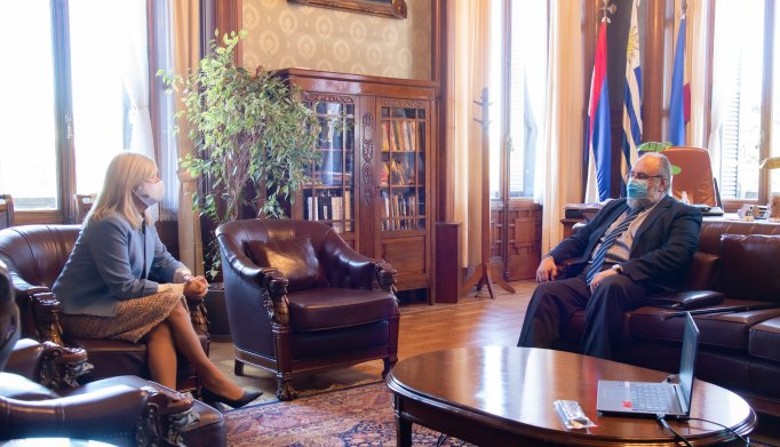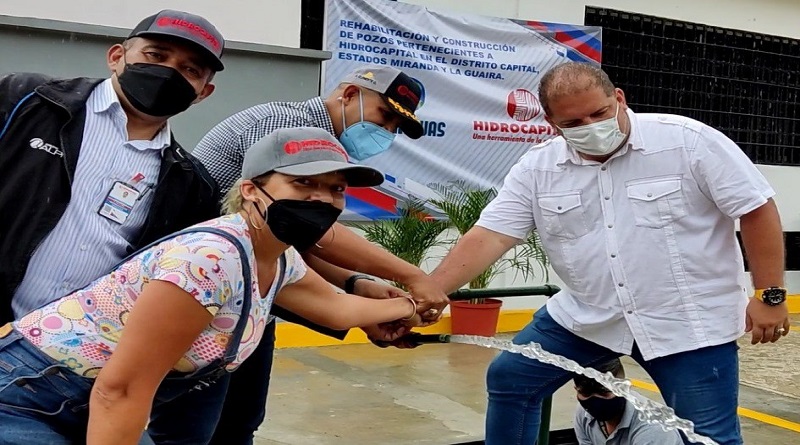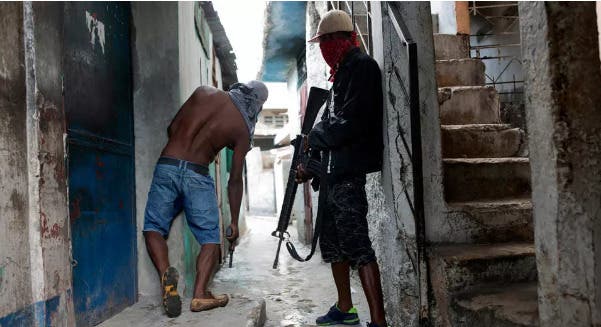Members of the Board of Directors of the National Human Rights Institution (INDDHH) delivered their 2021 Annual Report to the General Assembly. With the presence of its president, Juan Faroppa, the document was received this Friday the 29th at 3:00 pm by the president of the General Assembly, Beatriz Argimón.
As happens every year, the Institution is accountable for the management and activities carried out during the year to fulfill its mission of defending, promoting and protecting human rights in all its extension. According to article 68 of Law 18,446: «The The Board of Directors of the INDDHH will submit an annual report to the General Assembly within the first one hundred and twenty days of each year. For such purposes, the Board of Directors of the INDDHH will be received and heard in a special session of the General Assembly.”
As stated in the prologue of the publication signed by the Board of Directors, the Annual Report “is, essentially, an act of accountability, not only before the Legislative Power, as the legal mandate expresses, but before the entire Uruguayan society” .
Report Content
As in previous years, the Report is organized and divided into six chapters: 1) – Institutional management, 2) – Studies and reports on the situation of human rights in Uruguay, 3) – Knowledge, reception of complaints and investigations of alleged human rights violations, 4) – Prevention of torture. Defense and protection in situations of confinement, 5) – Education and promotion of human rights and 6) – The INDDHH in the territory.
According to what was reported by the institution, four annexes are added to these chapters that contain: the evolution of the functional structure of the INDDHH, budget execution, recommendations for visits by the National Mechanism for the Prevention of Torture, and the memory of the X National Assembly of Human Rights.
Chapter 1, dedicated to Institutional Management, explains that the activities of 2021 were framed in a particular context characterized by the health emergency and by adverse public reactions to the actions of the INDDHH. The government’s criticism of the Institution began in 2020 and consisted of “questioning its impartiality and independence, as well as its legitimacy and legal basis.” According to the Report, despite this, “the relationship of the INDDHH with State bodies and their dependencies is characterized by professionalism and, very frequently, fruitful exchange”.
This first chapter includes, among other topics, a presentation of the Institution, its legal framework, its strategic plan and areas of work. A selection of outstanding events in the year is included, and what has been done by various work teams that deal with issues of gender, ethnic-racial equity, people with disabilities, environment, right to biological identity, and the memory site located in the former headquarters of the Defense Information Service (SID).
Chapter 2, called Studies and reports on the situation of human rights in Uruguay, details the substantive contributions made by the INDDHH to comply with its legal obligation to issue opinions and recommendations on bills; regularly inform the bodies in charge of international and regional control of the obligations contracted by the Uruguayan State; make proposals on the most appropriate legal regulations and administrative practices for a better protection of human rights and prepare periodic reports to be submitted to Parliament.
In 2021, two reports on bills sent to Parliament stand out: on audiovisual content broadcasting services, and on shared ownership and co-responsibility in parenting. Reports produced on the situation of human rights in the country are also reviewed, relating to: aging and human rights; situation in Uruguay of human rights defenders (for the Ibero-American Federation of the Ombudsman, FIO), and the right to health (produced by the Economic, Social, Cultural and Environmental Rights Mirador, DESCA).
Among other contents, chapter 2 summarizes the cycle of five dialogues organized together with the Office of the United Nations High Commissioner for Human Rights (OACNUDH). The topics were: mental health, fundamental freedoms, guarantees for persons deprived of liberty, business and human rights, and violence against women. It also states that the Global Alliance of National Human Rights Institutions (GANHRI) renewed the accreditation of the INDDHH with category A, which corresponds to institutions that fully comply with the Paris Principles.
Chapter 3 is entitled Knowledge, reception of complaints and investigations of alleged human rights violations and includes details of the complaints received and the investigations carried out on alleged human rights violations. In 2021, the INDDHH issued a total of 129 resolutions (considering the seven types of resolutions provided for in Law 18,446) and the Complaints and Investigation area carried out a total of 627 interventions. 74% of these were advice and consultations and 26% were complaints of rights violations.
The Report includes a summary of each of the resolutions issued by the Board of Directors of the Institution, corresponding to three types of resolutions: with recommendations, satisfactory solution and non-collaboration. The latter refer to the agencies that refused to provide information (Article 23 of Law No. 18,446).
Prevention of torture is chapter 4. Defense and protection in situations of confinement, and it begins with a presentation of the National Mechanism for the Prevention of Torture (NPM) and the methodology that it applies in the systematic monitoring of places of deprivation of liberty. The report exposes the activity and the main findings and critical knots in five areas of work with people deprived of liberty: protection system for children and adolescents; juvenile penal system; police units; adult prison system and psychiatric institutions.
This text explains how, during the first half of 2021, the NPM reviewed its work methodology in the context of the Covid 19 pandemic. Monitoring by non-face-to-face means was prioritized, and for face-to-face visits a health protocol that reduced the number of officials and the duration of each visit. Subsequently, after the decrease in the number of cases and the greater opening of the centers, on-site visits were again prioritized.
In total, during 2021, the NPM made 81 face-to-face visits to places of confinement: 17 to the system for the protection of children and adolescents (INAU); 16 to the juvenile penal system (INISA); 20 to police units dependent on the Ministry of the Interior; 11 to the prison system for adults (INR), and 17 to psychiatric institutions.
Chapter 5 is dedicated to exposing the work of the Institution in Education and promotion of human rights. Among other topics, the awareness and dissemination activities in educational centers and aimed at the general public are detailed. Regarding the development of teaching materials, the creation of the game entitled Advancing rights stands out, which was declared of educational interest by the National Administration of Public Education (ANEP).
The report lists the numerous promotion and training activities carried out, the distance courses taught through the INDDHH/Educa platform; coordination with other institutions (ANEP, Plan Ceibal, IMPO and the Human Rights Secretariat of the Presidency of the Republic); the agreements signed with the UdelaR to carry out internships (degrees in Labor Relations and International Relations), and joint activities with other ombudsmen in the region. In particular, the INDDHH/Educa platform carried out four editions of the course on rights human rights and the role of the INDDHH. Since its creation, this course has already had twelve editions and 1,207 graduates.
Chapter 6, entitled The INDDHH in the territory, reports on the activities aimed at bringing the INDDHH closer to the country’s departments. This chapter reports on the generation of spaces for dialogue and participation with civil society organizations and the deepening of the thematic work in localities with less than 5,000 inhabitants and in cities far from the departmental capitals. In 2021, the Decentralization area implemented actions in Artigas, Cerro Largo, Durazno, Lavalleja, Rivera, Rocha, Salto, Tacuarembó and Treinta y Tres.
Among other topics, the Report sets out the strategy developed during 2021 in Salto and Lavalleja; the link with social organizations during the pandemic (their forms of organization and emerging issues); the results of an investigation carried out by the Faculty of Information and Communication (UdelaR) on human rights discourses in Tacuarembó; and the training instances carried out in coordination with the Studies area, the Mirador DESCA and the Institute of Public Policies of Mercosur.
The chapter also reports on the Childhood and Adolescence in Rural Environments project, focused on the enforceability of the human rights of children and adolescents who live in rural areas and in towns with less than 5,000 inhabitants.







